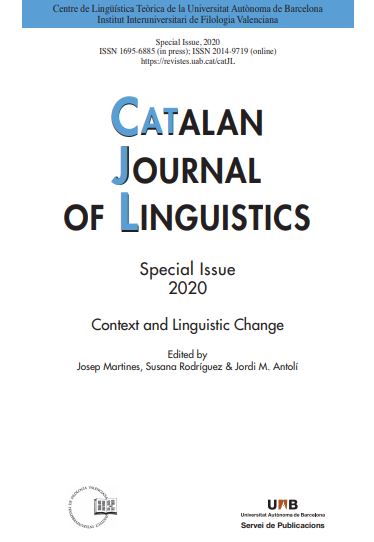Is “Back to my Point” a Pragmatic Marker? An Inquiry into the Historical Development of some Metatextual Discourse Management Markers in English
Article Sidebar

Main Article Content
Elizabeth Closs Traugott
Stanford University
Discourse management markers (DMMs) that “signal a meta-comment on the structure of the discourse” (Fraser 2009) are widely attested in historical data. Most discourse management markers (e.g. and, anyway, by the way, but, now, then) meet well-known criteria for pragmatic markers such as multifunctionality, opacity, optionality, (inter)subjectivity, relatively high frequency, and shortness. However, several cited in Fraser (2009), many of them topic-orientation markers, do not (e.g. back to my original point, to return to my previous topic, if I might continue). I propose that an account of the development of DMMs make a distinction between adverbial adjuncts, conjunct adverbials, and pragmatic markers (e.g. Hasselgård 2010). By hypothesis, change may occur along the cline: adverbial adjuncts > conjunct adverbials (> DMMs). This approach accounts for gradual form-meaning shifts and is consistent with a usage perspective on language as a dynamic system grounded in usage events (Kemmer & Barlow 1999; Langacker 2008).
Article Details
Cómo citar
Traugott, Elizabeth Closs. «Is “Back to my Point” a Pragmatic Marker? An Inquiry into the Historical Development of some Metatextual Discourse Management Markers in English». Catalan Journal of Linguistics, pp. 13-29, doi:10.5565/rev/catjl.307.
Biografía del autor/a
Elizabeth Closs Traugott, Stanford University
Elizabeth Closs Traugott is Professor Emerita of Linguistics and English at Stanford
University (B.A. in English, Oxford University 1960, Ph.D. in English Linguistics, University of California, Berkeley, 1964). She is a leading expert on historical syntax, semantics, and pragmatics, and the processes of grammaticalization and constructionalization. Her current research focuses on ways to bring construction grammar to bear on accounts of micro-changes, including the development of metatextual pragmatic markers in English.